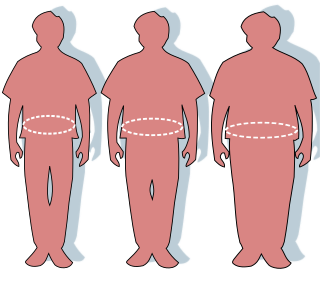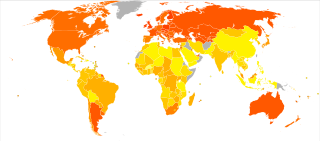Dieting is the practice of eating food in a regulated way to decrease, maintain, or increase body weight, or to prevent and treat diseases such as diabetes and obesity. As weight loss depends on calorie intake, different kinds of calorie-reduced diets, such as those emphasising particular macronutrients, have been shown to be no more effective than one another. As weight regain is common, diet success is best predicted by long-term adherence. Regardless, the outcome of a diet can vary widely depending on the individual.

Obesity is a medical condition, sometimes considered a disease, in which excess body fat has accumulated to such an extent that it can potentially have negative effects on health. People are classified as obese when their body mass index (BMI)—a person's weight divided by the square of the person's height—is over 30 kg/m2; the range 25–30 kg/m2 is defined as overweight. Some East Asian countries use lower values to calculate obesity. Obesity is a major cause of disability and is correlated with various diseases and conditions, particularly cardiovascular diseases, type 2 diabetes, obstructive sleep apnea, certain types of cancer, and osteoarthritis.

A food pyramid is a representation of the optimal number of servings to be eaten each day from each of the basic food groups. The first pyramid was published in Sweden in 1974. The 1992 pyramid introduced by the United States Department of Agriculture (USDA) was called the "Food Guide Pyramid" or "Eating Right Pyramid". It was updated in 2005 to "MyPyramid", and then it was replaced by "MyPlate" in 2011.

Low-carbohydrate diets restrict carbohydrate consumption relative to the average diet. Foods high in carbohydrates are limited, and replaced with foods containing a higher percentage of fat and protein, as well as low carbohydrate foods.
Calorie restriction is a dietary regimen that reduces the energy intake from foods and beverages without incurring malnutrition. The possible effect of calorie restriction on body weight management, longevity, and aging-associated diseases has been an active area of research.

David S. Ludwig is an American endocrinologist and low-carbohydrate diet advocate in Boston, Massachusetts. He is a promoter of functional medicine.

Marion Nestle is an American molecular biologist, nutritionist, and public health advocate. She is the Paulette Goddard Professor of Nutrition, Food Studies, and Public Health Emerita at New York University. Her research examines scientific and socioeconomic influences on food choice, obesity, and food safety, emphasizing the role of food marketing.

A very-low-calorie diet (VLCD), also known as semistarvation diet and crash diet, is a type of diet with very or extremely low daily food energy consumption. VLCDs are defined as a diet of 800 kilocalories (3,300 kJ) per day or less. Modern medically supervised VLCDs use total meal replacements, with regulated formulations in Europe and Canada which contain the recommended daily requirements for vitamins, minerals, trace elements, fatty acids, protein and electrolyte balance. Carbohydrates may be entirely absent, or substituted for a portion of the protein; this choice has important metabolic effects. Medically supervised VLCDs have specific therapeutic applications for rapid weight loss, such as in morbid obesity or before a bariatric surgery, using formulated, nutritionally complete liquid meals containing 800 kilocalories or less per day for a maximum of 12 weeks.

The American Society for Nutrition (ASN) is an American society for professional researchers and practitioners in the field of nutrition. ASN publishes four journals in the field of nutrition. It has been criticized for its financial ties to the food and beverage industry.
Intermittent fasting is any of various meal timing schedules that cycle between voluntary fasting and non-fasting over a given period. Methods of intermittent fasting include alternate-day fasting, periodic fasting, such as the 5:2 diet, and daily time-restricted eating.

Diet plays an important role in the genesis of obesity. Personal choices, food advertising, social customs and cultural influences, as well as food availability and pricing all play a role in determining what and how much an individual eats.

Weight management refers to behaviors, techniques, and physiological processes that contribute to a person's ability to attain and maintain a healthy weight. Most weight management techniques encompass long-term lifestyle strategies that promote healthy eating and daily physical activity. Moreover, weight management involves developing meaningful ways to track weight over time and to identify the ideal body weights for different individuals.

Robert H. Lustig is an American pediatric endocrinologist. He is professor emeritus of pediatrics in the division of endocrinology at the University of California, San Francisco (UCSF), where he specialized in neuroendocrinology and childhood obesity. He is also director of UCSF's WATCH program, and president and co-founder of the non-profit Institute for Responsible Nutrition.

Sugar-sweetened beverages (SSB) are any beverage with added sugar. They have been described as "liquid candy". Consumption of sugar-sweetened beverages have been linked to weight gain and an increased risk of cardiovascular disease mortality. According to the CDC, consumption of sweetened beverages is also associated with unhealthy behaviors like smoking, not getting enough sleep and exercise, and eating fast food often and not enough fruits regularly.
Satiety value is the degree at which food gives a human the sense of food gratification, the exact contrast feeling of hunger. The concept of the Satiety Value and Satiety Index was developed by Australian researcher and doctor, Susanna Holt. Highest satiety value is expected when the food that remains in the stomach for a longer period produces greatest functional activity of the organ. Limiting the food intake after reaching the satiety value helps reduce obesity problems.

Obesity and the environment aims to look at the different environmental factors that researchers worldwide have determined cause and perpetuate obesity. Obesity is a condition in which a person's weight is higher than what is considered healthy for their height, and is the leading cause of preventable death worldwide. Obesity can result from several factors such as poor nutritional choices, overeating, genetics, culture, and metabolism. Many diseases and health complications are associated with obesity. Worldwide, the rates of obesity have nearly tripled since 1975, leading health professionals to label the condition as a modern epidemic in most parts of the world. Current worldwide population estimates of obese adults are near 13%; overweight adults total approximately 39%.
George A. Bray is an American obesity researcher. As of 2016, he is a University Professor emeritus and formerly the chief of the division of clinical obesity and metabolism at Louisiana State University's Pennington Biomedical Research Center in Baton Rouge. He is also a Boyd Professor emeritus at the Pennington Center, and a professor of medicine emeritus at the Louisiana State University Medical Center.
Catherine Alison Geissler, Lady Auld is a prominent British nutritionist and author and co-author of widely recognised reference textbooks on human nutrition.
The carbohydrate-insulin model (CIM) posits that obesity is caused by excess consumption of carbohydrate, which then disrupts normal insulin metabolism leading to weight gain and weight-related illnesses. It is contrasted with the mainstream energy balance model (EBM), which holds that obesity is caused by an excess in calorie consumption compared to calorie expenditure. According to the carbohydrate–insulin model, low-carbohydrate diets would be the most effective in causing long-term weight loss. Notable proponents of the carbohydrate–insulin model include Gary Taubes and David Ludwig. The CIM has been tested in mice and humans. Although some experts consider that these studies falsified the CIM, proponents disagree. Available evidence does not support the existence of a long-term advantage in weight loss for low-carbohydrate diets.
Arne Vernon Astrup is a Danish nutritionist, chief physician, researcher, author and professor. He is known as a researcher, communicator and author and has published more than 900 scientific articles. In 2018 he was internationally recognised as one of the world's most cited researchers. Arne Astrup has contributed to the identification of GLP-1 as a satiety hormone, which has played a key role in the development of GLP-1 drugs for the treatment of obesity, which has contributed to the success of Novo Nordisk A/S and their drug Wegovy.











